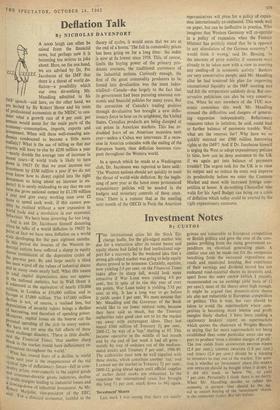Investment Notes
By CUSTOS
MHE international crisis hit the Stock Ex- I change badly, for the gilt-edged market was due for a correction after its recent boom and equity shares had failed to find institutional sup- port for a recovery. So the weekend idea that a strong gilt-edged market was going to help equity shares proved to be nonsense. Certainly, equities, now yielding 5.9 per cent. on the Financial Times index after its sharp fall, would look more attractive if War Loan were yielding 4.9 per cent., but in spite of its rise this year of over ten points, War Loan today is yielding 5.95 per cent. at 601. It has a long way to go before it yields under 5 per cent. We must assume that Mr. Maudling and the Governor of the Bank would like to see lower interest rates, because they have said as much, but the Treasury authorities take good care not to let the market run away with extravagant ideas. They last issued £500 million of Treasury 51 per cent., 2008-12, by way of a 'tap,' starting at 95. This became operative in the middle of last month and by the end of last week it had all gone— mainly by way of switches out of the medium- dated stocks and Treasury 5 per cent., 1986-89. The authorities must now be well supplied with these stocks, which constitute another 'tap,' and I cannot see the market in Treasury 51 per cent., 2008-12, going ahead again until official supplies of earlier dated stocks are exhausted. In the meantime the international crisis has brought this long 5; per cent. stock down to 94t again.
'Investment' Shares Last week I was saying that there arc equity
groups not vulnerable to European competition or British politics and gave the case of the com- panies profiting from the rising government ex- penditure on electrical generating plant. A similar case can be made out for the companies benefiting from the increased expenditure on roads and municipal housing. But experience of their earnings and dividend record has not endeared road-material shares to investors and, apart from the AMEY GROUP (which I recently recommended on an earnings yield basis of 12 per cent.), most of the shares seem high enough. It might be argued that domestic-store shares are also not vulnerable to European competition or politics. This is true, but care should be taken to avoid the supermarkets where com- petition is becoming more intense and profit margins finely shaded. I have been reading a cautionary brokers' report on supermarkets which quotes the chairman of Wrights Biscuits as saying that far more supermarkets are being established than some particular areas can sup- port to produce 'even a mOdest margin of profit.' The low yields from ASSOCIATED BRITISH FOODS (2.4 per cent.), LONDON GROCERS (1.8 per cent.) and TESCO (2.4 per cent.) should be a warning to investors to stay out of the market. The ques- tion is whether an investment' share like MARKS AND SPENCER should be bought when it drops, as it did this week, to below 79s., to yield 3 per cent. Personally 1 think there is no hurry. When Mr. Maudling decides to reflatc the economy in earnest—that should be the sig- nal to restart buying of the 'investment' shares in the consumer trades. But not before.














































 Previous page
Previous page